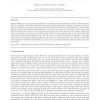Free Online Productivity Tools
i2Speak
i2Symbol
i2OCR
iTex2Img
iWeb2Print
iWeb2Shot
i2Type
iPdf2Split
iPdf2Merge
i2Bopomofo
i2Arabic
i2Style
i2Image
i2PDF
iLatex2Rtf
Sci2ools
132
click to vote
PE
2010
Springer
2010
Springer
Evaluating fluid semantics for passive stochastic process algebra cooperation
Fluid modelling is a next-generation technique for analysing massive performance models. Passive cooperation is a popular cooperation mechanism frequently used by performance engineers. Therefore having an accurate translation of passive cooperation into a fluid model is of direct practical application. We compare different existing styles of fluid model translation of passive cooperation in a stochastic process algebra and show how the previous model can be improved upon significantly. We evaluate the new passive cooperation fluid semantics and show that the first-order fluid model is a good approximation to the dynamics of the underlying continuous-time Markov chain. We show that in a family of possible translations to the fluid model, there is an optimal translation which can be expected to introduce least error. Finally, we use these new techniques to show how the scalability of a passively-cooperating distributed software architecture could be assessed. Key words: stochastic proc...
| Added | 20 May 2011 |
| Updated | 20 May 2011 |
| Type | Journal |
| Year | 2010 |
| Where | PE |
| Authors | Richard A. Hayden, Jeremy T. Bradley |
Comments (0)

